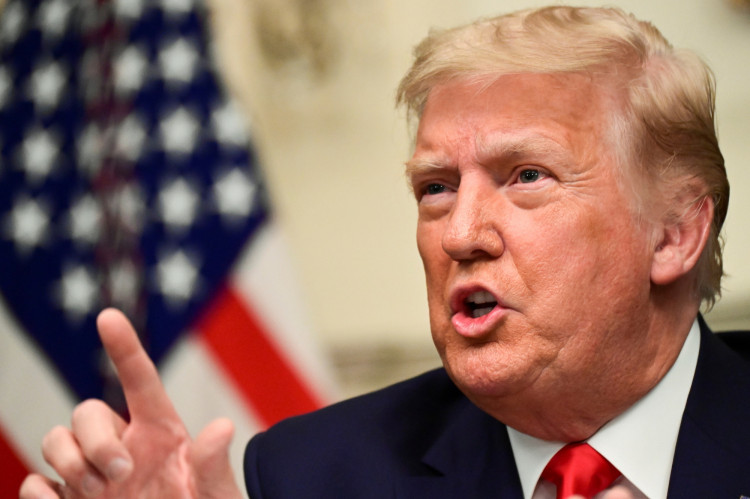President Donald Trump announced Monday that the United States will impose 25% tariffs on countries purchasing oil and gas from Venezuela, a move designed to tighten economic pressure on President Nicolas Maduro's regime and China, Venezuela's top oil customer.
The tariffs will take effect April 2 and apply to any trade those nations conduct with the U.S., Trump said in a post on his Truth Social platform. "Venezuela has been very hostile to the United States and the Freedoms which we espouse," Trump wrote. "Therefore, any Country that purchases Oil and/or Gas from Venezuela will be forced to pay a Tariff of 25% to the United States on any Trade they do with our Country."
Venezuela exported about 660,000 barrels per day (bpd) in 2024, according to Kpler data. China accounted for approximately 270,000 bpd of these exports, making it the largest buyer of Venezuelan crude, followed by the U.S. at 233,000 bpd. India and Spain purchased around 61,000 bpd and 60,000 bpd respectively.
"This announcement by the Trump administration appears to be one more action targeting China," said Matt Smith, lead oil analyst at Kpler, in comments to CNBC.
Brent crude futures rose 61 cents, or 0.85%, to $72.77 per barrel by early afternoon trading. U.S. West Texas Intermediate crude climbed 59 cents, or 0.86%, to $68.87. Roth analyst Leo Mariani told clients in a note, "We expect oil prices to go higher in light of this news and may rise further if Trump follows through with this proclamation."
In tandem with the tariff announcement, the Treasury Department extended Chevron Corp.'s license to operate in Venezuela until May 27. Trump previously vowed to reverse a Biden administration decision that allowed Chevron to restart oil production in partnership with Venezuela's national oil company, Petróleos de Venezuela (PDVSA).
Chevron CEO Mike Wirth personally lobbied administration officials to secure the extension, according to individuals familiar with the discussions. Chevron holds stakes in five major onshore and offshore projects in Venezuela.
Trump's tariffs are intended to curb Chinese influence in Venezuela's energy sector while ensuring U.S. access to Venezuelan oil through Chevron, sources told The Wall Street Journal last week.
Trump also renewed accusations against Maduro, alleging the Venezuelan government deliberately sent members of the Tren de Aragua gang to the U.S. "Among the gangs they sent to the United States, is Tren de Aragua, which has been given the designation of 'Foreign Terrorist Organization,'" Trump wrote. "We are in the process of returning them to Venezuela - It is a big task!"
Last month, Trump invoked the 1798 Alien Enemies Act, citing what he described as an invasion by Tren de Aragua. However, Federal District Court Judge James Boasberg blocked Trump's plan to deport alleged gang members under the act, prompting Trump to call for Boasberg's impeachment. Chief Justice John Roberts subsequently rebuked Trump's remarks, raising concerns of a brewing constitutional clash.
Trump's broader tariff strategy will also include duties on automobiles, pharmaceuticals, and aluminum, he confirmed during a cabinet meeting. Commerce Secretary Howard Lutnick praised the measures, stating, "April 2 is just around the corner. And that's American liberation day. That's the day when the rest of the world starts to treat America with respect."
Lutnick also announced plans to launch a new federal agency, the External Revenue Service, to oversee the collection of tariffs. Critics, however, pointed out that U.S. Customs and Border Protection already administers tariff collection, and establishing a new agency would require Congressional approval.
The renewed pressure campaign marks a continuation of Trump's "maximum pressure" approach against Maduro, first initiated during his previous term. The Trump administration has accused Maduro's government of human rights abuses, corruption, and political repression, offering a $15 million reward for information leading to Maduro's arrest.
Maduro has pushed back, accusing the U.S. of attempting to destabilize Venezuela and exacerbate its economic crisis. Venezuela, home to the world's largest proven crude oil reserves, remains heavily reliant on energy exports, which have declined sharply over the past decade.
According to the U.S. Energy Information Administration, Venezuelan oil production has dropped from 3.2 million bpd in 2000 to around 735,000 bpd in late 2023. OPEC data valued Venezuela's petroleum exports at approximately $13.68 billion last year.






